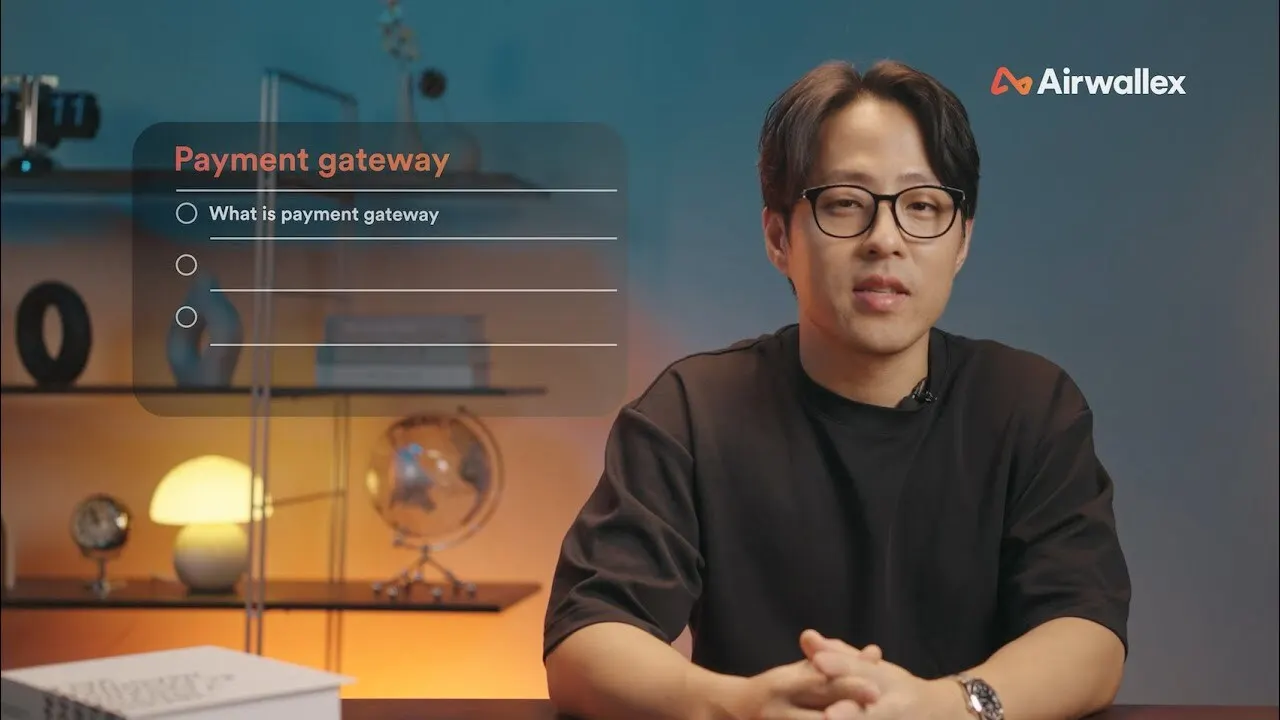What is an International Payment Gateway?

The Airwallex Editorial Team

Key takeaways
An international payment gateway streamlines global transactions by managing currency conversion, security, compliance and processing all in one place.
Choosing the right gateway unlocks faster global growth, stronger customer experiences and simpler financial operations.
To find the best fit, compare providers based on fees, supported currencies, integration flexibility and available payment methods.
International expansion is a priority for many businesses, but success hinges on more than just ambition. Without the right systems in place, accepting payments from overseas customers can quickly become a barrier.
In Australia, around two-thirds of online businesses now sell internationally¹. Yet many still rely on outdated infrastructure, which creates friction in the payment process.
A modern international payment gateway offers a better way forward. It simplifies currency conversion, lowers transaction costs and streamlines global transactions, without the usual complexity.
This guide explores how an international payment gateway works and outlines what to look for when choosing a provider.
What is an International Payment Gateway?
International payment gateways or global payment gateways are commonly used terms for technologies which process payments from overseas customers. They simplify cross-border transactions by accepting payments in multiple currencies, settling funds quickly, and offering an integrated buying experience for customers — no matter where they are across the globe.
They handle all the tasks in the background required for a seamless payments experience. This includes collecting, encrypting and transmitting transaction data, as well as transaction authorisation, currency conversion, fraud detection and funds settlement.

What are the benefits of using a Global Payments Gateway?
While traditional cross-border payment methods like bank transfers, Swift and wire services are still common, they often fall short on speed, cost-efficiency and ease of reconciliation. An international payment gateway provides a more efficient, scalable solution built for modern business needs. Here's why:
Accept multi-currency payments: Customers can choose to pay in their local currency rather than the merchant’s base currency. This creates a more familiar and transparent checkout experience, reducing uncertainty around exchange rates. For merchants, automatic currency conversion can open up an additional savings by applying a competitive FX margin on the converted amount, while still offering customers clarity and choice at the point of sale.
Same-currency settlement: Some global payment gateways can settle and hold funds in another currency to reduce conversion fees. This makes it cheaper and easier if the business also makes payments in foreign currencies.
Competitive costs and FX rates: While traditional international bank transfers might seem “simple,” they may often come with hidden costs such as FX markups, longer settlement cycles, and admin overheads. International payment gateways can lower the total cost of ownership through better FX rates, faster settlement, automation, and lower error rates.
Multiple integration options: Most international payment gateways integrate directly with an eCommerce platform or website, enabling real-time, automated payments at checkout. For example, Airwallex’s Global Payment Solutions offers multiple integration methods such as pre-built web components, popular eCommerce platform integrations, payment links and a custom API. This gives more control over how payments are received.
Enhanced eCommerce customer experiences: Most traditional global payment methods require customers to leave the website to complete the transaction. Integrating a global payment gateway keeps the entire payment flow within the online store. Leading international payment gateways such as Airwallex also support localised, global payment methods, which allow customers to pay in their own currency — a known tactic to reduce cart abandonment and increase conversion rates.
Faster settlement and improved cash flow: While traditional cross-border payments can take multiple days, or even weeks to process, modern payment gateways can settle funds as quickly as 24 to 48 hours. This accelerated cash flow gives finance teams more flexibility and helps improve working capital.
Built-In security and global compliance: Leading payment gateways come with PCI DSS compliance, tokenization, encryption, and real-time fraud detection built in. They may also help to comply with global privacy and data protection regulations (e.g. GDPR), reducing legal and reputational risk without adding technical burden.
Scalable infrastructure: A robust payment solution can support higher volumes, more currencies and more payment methods without disrupting operations or needing to replatform as the business grows and expands.
24/7 availability across time zones: Gateways operate around the clock, so payments can be accepted and processed from customers in any time zone, at any time. No more waiting for “the next three to five business days” for payments to clear.
How do International Payment Gateways work?
When a customer makes a purchase in a foreign currency, the international payment gateway will perform a series of steps in the background:
The customer enters their payment details (e.g. credit card or local payment method) and the payment gateway encrypts the customer’s details.
The payment gateway securely transmits the payment information to the payment processor. If the payment gateway offers automatic currency conversion, the payment is converted to the customer’s selected currency in this step.
The payment processor routes the transaction to the customer’s issuing bank (or alternative payment provider) to request authorisation.
The customer’s bank approves or declines the payment. If approved, the funds are authorised and the transaction is confirmed.
The payment is then settled, meaning the funds move from the customer’s account to the merchant’s business account.
The international payment gateway simplifies this process so that for the customer, it’s a few clicks and a seamless buying experience. For a merchant’s business, it allows acceptance of multiple currencies from different countries with minimal setup and admin overhead.
What kind of businesses need an International Payment Gateway?
Any business that sells to customers overseas or plans to expand globally should consider an international payment gateway. This includes:
eCommerce retailers with international shoppers.
SaaS platforms offering products and subscriptions across multiple regions.
Freelancers, agencies and consultancies billing overseas clients.
Travel, hospitality, and education providers accepting bookings from abroad.
Export businesses and wholesalers dealing in foreign markets.
Features to consider when choosing a Global Payment Gateway
Supported payment methods and localisation
What to look for: Ability to accept a wide range of global and local payment methods preferred by current and future target customers. For example, credit/debit cards, wallets (Apple Pay, Google Pay), bank transfers, BNPL, Alipay in China, SEPA in Europe, etc.
Why it matters: Customers are more likely to convert when they see familiar payment options and can pay in their local currency.
For reference, Airwallex accepts over 160+ payment methods around the globe. See the full list here to find out whether your preferred payment type is accepted.
Multi-currency support
What to look for: Ability to accept and settle payments in multiple currencies. While some payment providers enable acceptance of payments in various currencies, they may enforce conversion and require settlement in AUD. This can result in additional currency conversion fees when issuing refunds or paying suppliers in the original transaction currency.
Airwallex can accept payments from over 130+ currencies and settle into 14+ different currencies with a Global Business Account, all under the same subscription.
Why it matters: Reduces hidden FX fees, improves pricing transparency, and protects margins. Allows businesses to control which currencies are held and when conversions take place.
FX fees and pricing structure
What to look for: Pricing across providers can be complex, especially when it comes to foreign exchange rates and payment types. Look for:
Transparent fee structures that are easy to understand and cost-effective.
Clear FX margins, ideally aligned with mid-market rates.
Flexible pricing models such as fixed, interchange++, or blended fees.
No hidden costs, including chargeback fees and conversion markups.
Common costs include:
Monthly subscription or account-keeping fees
Transaction fees
Currency conversion margins
Chargeback fees
Why it matters: Understanding the full fee structure helps assess the total cost of doing business internationally and avoid unexpected charges.
Separate merchant accounts
What to look for: Some international payment gateway providers bundle a merchant account with their international payment gateways. Whereas others require you to sign up for a separate merchant account with a bank. Some payment providers may also require a foreign bank account to settle in that particular currency.
Why it matters: Bundled accounts are simpler and tend to be less costly as you don’t need to manage a separate facility. They also may offer integrated reporting into a single dashboard. Holding a separate merchant account may attract higher fees, and the application process tends to be more rigorous.
Settlement speed
What to look for: Fast payout times (e.g. 24 to 48 hours). For example, funds can be settled on the same-day or on a custom date with Airwallex².
Why it matters: Improves cash flow and allows faster reinvestment into the business.
Security and compliance
What to look for: PCI DSS compliance, 3D Secure authentication, two-factor authentication, tokenisation, fraud prevention tools, and regulatory compliance (e.g. GDPR and anti-money laundering/counter-terrorism financing).
Why it matters: By meeting the highest global security and compliance standards, payment providers can help better protect customer data, reduce risk of fraudulent transactions, and build trust with your customers.
Integration and Compatibility
What to look for: Easy integration with your preferred eCommerce platform (e.g. Shopify, WooCommerce), invoicing system or other software. Depending on your needs, look for a provider with flexible integration methods, from no-code to fully customisable APIs.
Why it matters: Allows for control over your checkout experience, minimises tech debt, and tailors payments towards your business’ needs.
Reporting and analytics
What to look for: A comprehensive range of reporting tools, such as dashboards with real-time transaction data, settlement reporting, cost reporting, refund management, and reconciliation tools.
Integrations into accounting and bookkeeping software may also help streamline reporting and administrative overhead.
Why it matters: Helps monitor performance, identify trends, reduce reporting admin and make better business decisions.
Customer support
What to look for: The best global payment providers offer 24/7 support, informative help centres, and have a local presence in Australia. Some providers offer dedicated account managers (usually at higher transaction volumes).
Why it matters: Issues with payments can be critical to your business – responsive support helps minimise downtime and any impact on customers.
Scalability
What to look for: Handles increasing transaction volumes and expansion into new markets without switching providers. Look for a provider which has multiple tiers, flexible integration options and features that can grow as the business grows.
Why it matters: Avoid replatforming which saves time and resources as the business grows. Truly scalable payment providers may offer negotiated pricing as certain transaction thresholds are met.
Ready to Simplify Global Payments?
Businesses aiming to streamline global payment processes can benefit from a trusted payment gateway for international transactions. These platforms help accelerate operations, reduce costs, and eliminate friction from cross-border payments. Airwallex is purpose-built to support international expansion – explore its global payment solutions or connect with the team to establish the right infrastructure.
International payment gateways: Frequently asked questions
What is an international payment gateway?
An international payment gateway is a service that enables businesses to accept payments from customers across different countries and currencies, often with built-in FX conversion, security, and compliance tools.
How does an international payment gateway differ from a domestic one?
While a domestic gateway typically supports only local currency and banking systems, an international online payment gateway allows for multi-currency payments, cross-border settlements, and global compliance.
What currencies can be accepted?
This depends on the provider. Some payment gateways for international payments support 10–20 currencies, while others like Airwallex support over 130+ currencies with settlement into 14+.
Is settlement instant?
Most international payment gateway providers settle within 24–48 hours, but timing can vary based on payment method and provider.
Is Airwallex an international payment gateway?
Yes. Airwallex provides an international payment gateway with multi-currency support, fast settlement, local payment methods, and secure global infrastructure.
Sources:
https://www.redsearch.com.au/resources/australian-ecommerce-statistics/
https://www.airwallex.com/docs/transactional-fx__funding-and-settlement-models#settlement-timing
View this article in another region:SingaporeUnited KingdomUnited States

The Airwallex Editorial Team
Airwallex’s Editorial Team is a global collective of business finance and fintech writers based in Australia, Asia, North America, and Europe. With deep expertise spanning finance, technology, payments, startups, and SMEs, the team collaborates closely with experts, including the Airwallex Product team and industry leaders to produce this content.
Posted in:
Online payments
